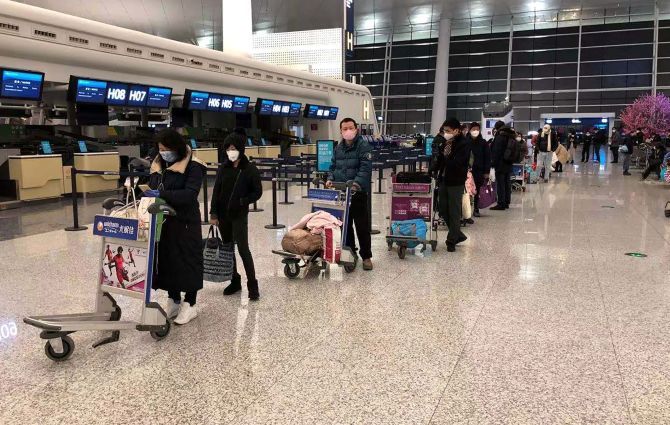The Union health ministry on Sunday issued a set of revised guidelines for international arrivals wherein passengers flying to India from August 8 can skip institutional quarantine if they submit COVID-19 negative test reports.

According to the guidelines, this test should have been conducted within 96 hours prior to undertaking the journey.
'The travellers can also seek exemption from institutional quarantine by submitting a negative RT-PCR test report on arrival. This test should have been conducted within 96 hours prior to undertaking the journey. The test report should be uploaded on the portal www.newdelhiairport.in for consideration,' the guidelines stated.
As of now, all international passengers have to undergo mandatory seven days institutional quarantine at their own cost, followed by seven days isolation at home.
As per the revised guidelines, from August 8 onwards, if a passenger gets exemption on the basis of COVID-negative test result as mentioned above, he or she will need to undergo home quarantine for 14 days.
'Only for compelling reasons/cases of human distress such as pregnancy, death in family, serious illness and parent(s) with children of the age of 10 years or below, home quarantine may be permitted for 14 days,' the ministry said.
'If they wish to seek such exemption, they shall apply on the online portal at least 72 hours before boarding. The decision taken by the government as communicated on the portal will be final,' it said.
Each passenger shall also submit a declaration with respect to authenticity of the report and will be liable for criminal prosecution, if found otherwise.
The test report could also be produced upon arrival at the point of entry at airport in India, it said.
Before boarding the plane or ship, the guidelines said the dos and don'ts shall be provided along with the tickets to travellers by the agencies concerned.
All passengers shall also be advised to download Arogya Setu application on their mobile devices, it said.
The guidelines also said that at the time of boarding the plane or ship, only asymptomatic travellers will be allowed to board after thermal screening.
'Passengers arriving through the land borders will also have to undergo the same protocol as above, and only those who are asymptomatic will be enabled to cross the border into India,' it added.
Suitable precautionary measures such as environmental sanitation and disinfection shall be ensured at the airports and during boarding; and at the airports, all possible measures to ensure social distancing to be ensured, it said.
During travel, those who had not filled in self-declaration forms on the portal shall fill the same in duplicate in the flight and ship, and a copy of the same will be given to Health and Immigration officials present at the airport/seaport/land port, the guidelines said.
'Alternatively, such travellers may submit a self-declaration form on the online portal at arriving airport/seaport/land port as per the directions of the concerned authorities, if such facility is available,' it said.
The guidelines further said suitable announcements about COVID-19, including precautionary measures to be followed, shall be made at airports or ports and in flights/ships and during transit.
'While on board the flight or ship, required precautions such as wearing of masks, environmental hygiene, respiratory hygiene, hand hygiene are to be observed by airline/ship staff, crew and all passengers,' it said.
On arrival, the guidelines said deboarding should be done ensuring social distancing.
'Thermal screening would be carried out in respect of all the passengers by the Health officials present at the airport/seaport/land port. The self-declaration form filled online shall be shown (or a copy of physical self-declaration form to be submitted) to the airport health staff,' it said.
The passengers found to be symptomatic during screening shall be immediately isolated and taken to a medical facility as per protocol, it said.
Post thermal screening, the guidelines said the passengers who have been exempted from institutional quarantine will show the same to the respective state counters on their cell phones/other modes before being allowed home quarantine for 14 days.
'The remaining passengers shall be taken to suitable institutional quarantine facilities, to be arranged by the respective state/UT governments,' it said.
These passengers shall be kept under institutional quarantine for a minimum period of seven days. They shall be tested as per ICMR protocol and if they test positive, they shall be assessed clinically, the guidelines said.
'If they are assessed as asymptomatic/pre-symptomatic/very mild cases, they will be allowed home isolation or isolated in the COVID Care Centre (both public and private facilities) as appropriate,' it said.
Those having mild/moderate/severe symptoms will be admitted to dedicated COVID health facilities and managed accordingly, it said.
If found negative, they shall be advised to further isolate themselves at home and self-monitor their health for seven days.
In case any symptoms develop, they shall inform the district surveillance officer or the state/national call centre (1075), the guidelines added.
However, the guidelines said states can develop their own protocol with regards to quarantine and isolation as per their assessment post arrival of passengers in the state concerned.
The guidelines will come into effect from August 8.











 © 2025
© 2025